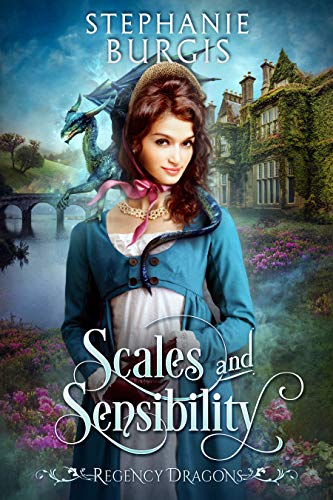It was a truth universally acknowledged that any young lady without a dragon was doomed to social failure. [opening line]
England, 1817. Small 'dragons' have been discovered in South America, and have become fashion accessories. Elinor Tregarth's frightful cousin Penelope has one, of course, but he isn't properly housebroken and she treats him appallingly. Elinor, as the poor orphaned cousin living on the charity of her withdrawn aunt and enabling uncle, hardly dares complain: but one afternoon Penelope's behaviour becomes too much to bear, and shortly thereafter Elinor departs the Hall with only the clothes she stands up in, a few coins she's managed to save, and Sir Jessamyn the dragon.
Encountering a charming fortune hunter and his scientific friend -- who maintains that fairy tales are just stories, that dragons have no magic whatsoever and certainly can't breathe fire -- Elinor hopes that they will aid her escape. But through an unfortunate combination of events, Elinor finds herself back at the Hall, magically masquerading as Mrs DeLacey, a fashionable influencer -- and trying to avoid blackmail, penury, discovery and true love.
This was charming: frothy and funny, romantic and fantastical, and with some excellent secondary characters. I particularly liked the underlying awareness of class, privilege and wealth. Elinor's parents were ruined by an unscrupulous entrepreneur; the maid Sally is keen to find restitution, if not justice, for her sister's dismissal after being framed for theft; Elinor is keenly aware that without money of her own, she has few recourses.
I can report happy endings all round, at least for those who deserve them, and some tantalising hints -- Elinor has two sisters, similarly exiled to friends and relatives in distant parts -- of further novels in the series.
I hereby declare this my first 52 books in 52 weeks book of the year, meeting the 'Jane Austen-inspired' challenge, if only for that opening line.

No comments:
Post a Comment